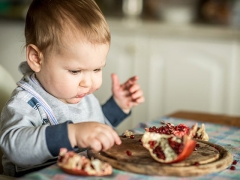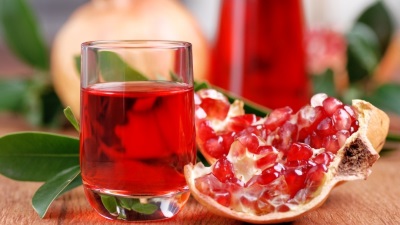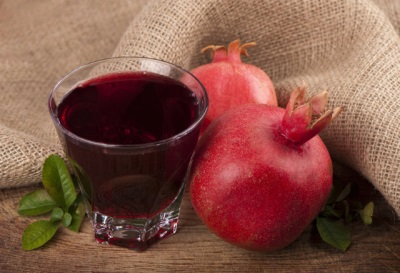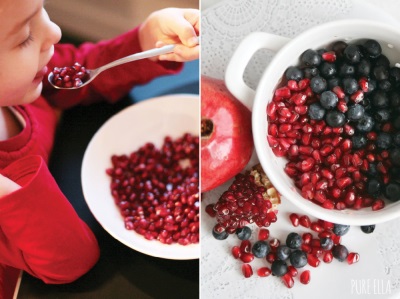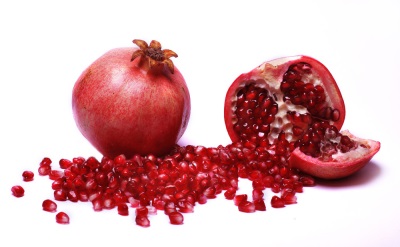Can children use pomegranate and at what age can pomegranate juice be given?
Children older than 4-6 months can no longer be fed only my mother's milk or a mixture. They need food that can provide the growing body with valuable vitamins and minerals. In this respect, fruit lure is especially important, and it usually starts with apples, pears and bananas. When it is possible to give a child a pomegranate, is this fruit useful for children, does it bear danger because of the presence of seeds, and how to introduce it into the children's diet correctly?
Benefit
Pomegranate is rich in organic acids, amino acids, polyphenols, vitamins (especially ascorbic acid), pectin substances, minerals and many other valuable compounds.
The use of pomegranate has such an effect on the human body:
- Strengthens immunity and increases resistance to colds.
- Helps fight viruses.
- Renders diuretic and choleretic act.
- Increases hemoglobin level.
- Affects blood clotting.
- Strengthens the gums and has antiseptic properties, which is important when gingivitis, sore throat or stomatitis.
- Improves appetite.
- Tones the nervous system.
- It has an astringent effect.
Harm
If you use pomegranate juice undiluted, it can damage the lining of the digestive tract, as well as the tooth enamel. That is why pomegranate juice should be drunk with diluted water, and after drinking it is recommended to brush your teeth.
You should also make sure that the child does not accidentally eat a piece of pomegranate peel, because it contains alkaloids that are dangerous for the crumbs.
Contraindications
Pomegranate juice can not be drunk with:
- Pancreatitis;
- Gastritis;
- Peptic ulcer disease;
- Allergies to grenades;
- Constipation;
- Oxaluria.
From what age can be given in prikorm?
In the absence of a tendency to allergies to the child, you can begin to give pomegranate from the age of one. Children over 1 year old are given to try the juice of this fruit diluted with water, starting with a teaspoon.
Pomegranate seeds are allowed to give to children older than 3 years due to the presence of seeds in them. Also postpone familiarity with pomegranate juice to the age of three is recommended in the case of allergic diseases in a child.
In what form is it better to give a one-year-old child?
Pomegranate for children 1-3 years old is best to give in the form of juice. It is important to remember about moderation and not to give such a product every day.
Give the baby only sweet fruits, because there are too many acids in the sour pomegranate juice that can damage the baby's stomach.
In the next video you will learn how to quickly clean the grenade.
Is it possible to eat pomegranate with stones and what is the probability of appendicitis?
Many children eat pomegranate without spitting out the bones, which causes an experience for parents, as there is a theory linking the use of this fetus with bones with the appearance of appendicitis.
Doctors say that such a link has not been proven, and the food that is difficult to digest, which are the pomegranate seeds, will most likely cause not an inflammation of the appendix, but an invagination of the intestine. Although, this pathology is caused not only by the seeds eaten in large quantities from pomegranates, but also by the excess of legumes and seeds in the diet.
In a small amount the pomegranate stones are harmless and leave unchanged with feces. The danger to the health of children is only a significant amount of eaten bones. Therefore, giving the baby a pomegranate, parents still need to consider the child’s age and the immaturity of the child’s intestines.
How to make pomegranate juice?
It is very easy to make pomegranate juice at home using a citrus press. After cutting the pomegranate into two halves using a press, squeeze the juice out of them. It is not worth running a pomegranate through an electric juicer, as you get a large amount of oil cake and a small amount of juice.
The second option for obtaining juice will be exposure to the fruit with your hands. You can knead the fruit with your fingers or roll it around the table with effort. As a result, the grains under the peel will become crushed, and you will only have to make a small hole in the skin of the pomegranate and squeeze the juice into a glass.
It is even easier to extract the juice from the pomegranate seeds by peeling the fruit and folding the seeds into a sieve. Press down on top of them with a tolkushkoy, and collect the flowing juice from the bottom and strain through gauze.
2 easy ways to prepare pomegranate juice, see the following video.
Consumption rates
It is recommended to drink pomegranate juice twice a week, while it should be diluted with water 1 to 1. Children from one to three years old can drink up to 100 ml of diluted pomegranate juice per day. For children 3-7 years old, the daily dose of such a useful drink is increased to 200-250 ml, and for children over 7 years old - up to 400 ml.
The pulp of ripe pomegranate is also recommended no more than 2 times a week. Children from three to seven years old need to eat at once from 1/4 to 1/2 grenade. A child over the age of 7 can eat a whole fruit 1-2 times a week.
Tips for choosing
Pomegranate for a child is best purchased in a supermarket, and not from a street tray. Choose a fruit with a uniform color of dark red or brownish. Pomegranate should be heavy, with a hollow skin without specks, and also firm to the touch. Soft areas of the fruit indicate damage during transport or rot. The stem of a ripe pomegranate will be dry.
If you picked up a bright fruit with a non-dried stalk and a smooth smooth skin, and when clicking on a grenade, the sound will be deaf (a ripe fruit must have a sound with a metallic tinge), then such a garnet is immature. If there are cracks on the peel, then an overripe fruit is in front of you.
